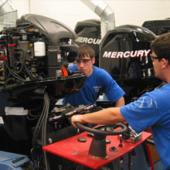Motorboat Technician

Also Called: Marine Equipment Mechanic
Job Description: Motorboat technicians maintain, repair, and overhaul everything from jet skis to cabin cruisers and commercial fishing boats. The region in which a mechanic resides and works obviously dictates the types of vessels he generally works on; however, virtually all marine equipment technicians are trained to be familiar with both outboard engines and stern drives. In addition, most programs also provide instruction in both two- and four-stroke personal watercraft engines. Motorboat technicians must also be well versed in hull design, plumbing systems, rigging, propeller design, and all other aspects of motorboat maintenance. From 1500-foot ocean-going tankers to PWC’s, marine vessels represent the widest range in design and function of any form of transportation. Therefore, the range of occupational opportunities is considerately more diverse than that of an automotive technician.
Working Environment: One of the obvious advantages of being a motorboat technician is the guarantee that you will live on the coast or near freshwater rivers and lakes. Repair shops are typically incorporated into a larger marine complex that provides a marina and dry-dock. Repair facilities are usually very large so as to accommodate the vast array of diagnostic equipment, tools, lifts and hoists required to work upon vessels that may be very long and weigh tens of thousands of pounds. Often a forklift is utilized to transport smaller motorboats and personal watercraft around the grounds of the marina. Other repairs, however, must be accomplished outside with the boat remaining in the water, which often necessitates working in very cramped and awkward positions.
Education and Training Requirements: In much the same fashion as other fields of transportation, marine maintenance employers are now looking for individuals with formal postsecondary training and certified credentials. As in automotive repair, the best programs are associated with a trade school or community college education. These programs typically require one to two years of alternating between classroom time and hands-on work experience. Trade schools offer the quickest completion time since they limit the curriculum solely to courses directly applicable to marine maintenance. In the latter half of the training process, these courses specialize in the products of a certain manufacturer such as Volvo-Penta, MercTech, Honda outboards, etc. Workstations are set up in high-tech labs that allow students to diagnose, troubleshoot, and repair common malfunctions and sometimes disassemble and rebuild entire vehicle systems. These clinics build confidence from hands-on experience so that the new technician can make an easy transition into his first job.
Salary Range:
Median Hourly Wage: $14.00
Middle 50 percent: $11.00-$17.00
Highest 10 percent: Greater than $21.00
Job Outlook: Good to Excellent. Through the year 2010, employment in the marine maintenance field is expected to increase about 10-20%, which is about as fast as the average. The growth of disposable income and the large proportion of people surpassing the 40 year mark should increase the sales of motorboats thereby enhancing the need for skilled motorboat technicians.

- Facebook Like
- Google Plus One
- 11724 reads
